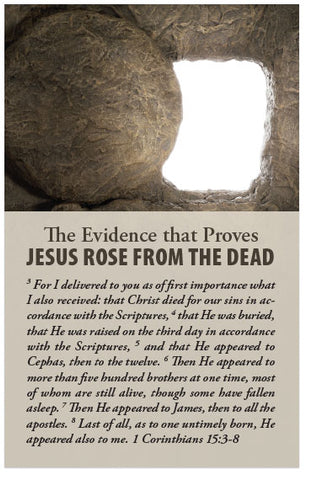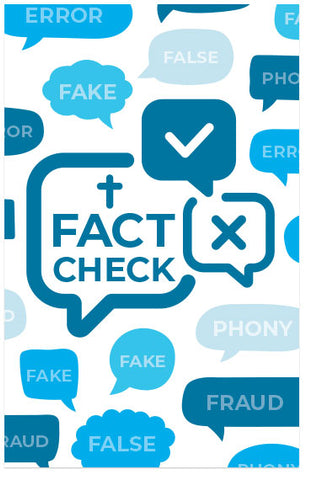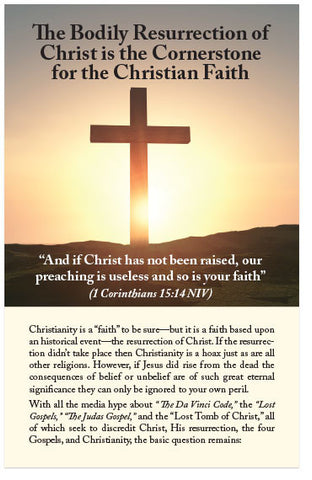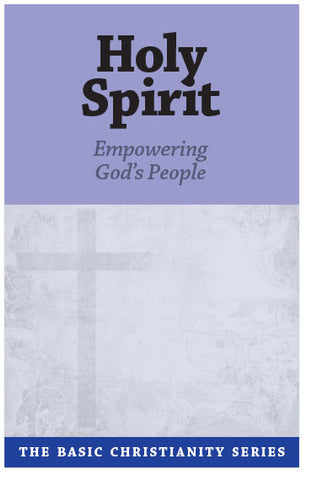Basic Christianity Series #4: Forgiveness
Special-Order Folded Tract
 NOTE: This item is custom-printed to order (click for more details).
NOTE: This item is custom-printed to order (click for more details).
This tract is from our print-on-demand library, and is not kept in stock. Select the options below, and we will custom-print a batch just for you. Because this item is custom-printed, you can add your custom imprint to the back page at no extra cost.
- Estimated shipping date: Wednesday, March 18 (Click for more details)
- SKU:
- Discounts: Discount coupons do not apply to this item
- Format: Folded Tract
- Size: 3.5 inches x 5.5 inches
- Pages: 8
- Imprinting: Available with 5 lines of custom text
- Returns: Because this item is custom-printed to order, it cannot be returned.
Show all item details
The full text of this tract is shown below. (Do you want to print this tract in a different version than the one listed? Contact us and let us know what you're looking for—we may be able to create the alternate version for you at no charge.)
Forgiveness
Forgiveness has a two-fold significance for everyone. First is the personal need to be forgiven for sinning against the God who created you. Second is your need to forgive those who have hurt or wronged you as you learn to walk in God’s ways.
You came into this world as a sinner, in the family line of Adam’s heritage, separated from the life of God. No one can avoid the universal and inescapable judgment of sin and its consequent penalty. For the wages of sin is death (Romans 6:23). All of us, like sheep, have strayed away. We have left God’s paths to follow our own (Isaiah 53:6). For everyone has sinned; we all fall short of God’s glorious standard (Romans 3:23).
But God in his grace and mercy knew from the foundation of the world that you were personally incapable of meeting his requirements in payment for your sinful and lost condition. …without the shedding of blood there is neither release from sin and its guilt nor the remission of the due and merited punishment for sins (Hebrews 9:22).
The Gospel is referred to as “good news” because of the absolute assurance you can have that all of your sins are forgiven when you choose to believe in Jesus Christ as God’s only Son who came to this earth to give his life to redeem you from the penalty of your sins. He (God) is so rich in kindness and grace that he purchased our freedom with the blood of his Son and forgave our sins (Ephesians 1:7). This is my blood of the covenant, which is poured out for many for the forgiveness of sins (Matthew 26:28). …if we confess our sins to Him, He is faithful and just to forgive us our sins and to cleanse us from all unrighteousness (1 John 1:9). It’s important to know your sins are forgiven and you are fully accepted by God: …the free gift of God is eternal life through Christ Jesus our Lord (Romans 6:23).
How complete is God’s forgiveness? …He has rescued us from the kingdom of darkness and transferred us into the Kingdom of his dear Son, who purchased our freedom and forgave our sins (Colossians 1:13-14).
To understand the fullness and power of God’s total forgiveness of your sins it can be helpful to see it in the light of your need to forgive others who have hurt and offended you. Forgiveness is a concept that can be meaningful when you are on the receiving end, but painfully demanding when you wrestle with the inner tension pressing you to forgive someone who has wronged you. Forgiveness is something you must learn to give, not just something you receive. When you are wronged, hurt, resentful, or angry toward others, your life will be less stressful if you follow in God’s ways and forgive.
We have often heard and used the Lord’s Prayer saying …forgive us our sins, as we forgive those who sin against us (Matthew 6:12). Clearly the Lord called on us to forgive those who have wronged or hurt us: Make allowance for each other’s faults, and forgive anyone who offends you. Remember, the Lord forgave you, so you must forgive others (Colossians 3:13). …be kind to each other, tenderhearted, forgiving one another, just as God through Christ has forgiven you (Ephesians 4:32).
The importance of forgiveness cannot be overstated. The Scriptures make it clear that forgiveness must be both received and given if you are to abide in Christ, living in the abundance of life the Lord himself has called you into. In prayer there is a connection between what God does and what you do. Forgiving others helps you to understand the power of forgiveness as well as acknowledge what God has done for you. …when you are praying, first forgive anyone you are holding a grudge against, so that your Father in heaven will forgive your sins, too (Mark 11:25). A line of communication and closeness is vital to your stability and well-being as a child of your Heavenly Father.
Like so many issues in life, forgiveness is reduced to a decision, a determination you make in your will. It may begin with a mental exercise, a conviction you sense in your deepest being, or maybe an inner prompting to manage your life in obedience to God. Ultimately it comes down to a choice you make, something determined apart from your feelings and emotions. Forgiveness is always a matter of a choice combined with faith.
Why is it so important for you to be forgiving when wronged? When someone hurts you, you are the only one who can let that hurt turn into resentment, bitterness, and anger. You are the one who can sometimes sink into the bondage that unforgiveness can bring. Only forgiveness can free you from that bondage and release you from the prison of discontent.
How do you bring yourself to the decision to forgive when the pain of being wronged is so overpowering? You have the ability, as a Christian with the indwelling Holy Spirit, to take charge of your thinking, emotions, and physical desires. The Scriptures exhort you to take charge of your thinking by refusing those thoughts that are improper and undesirable. You must aggressively choose to think on correct thoughts: …bringing every thought into captivity to the obedience of Christ (2 Corinthians 10:5). You are also called to take charge of your emotions. It is just as harmful to accept the feelings of resentment and act on those feelings as it would be wrong to accept and act on an inappropriate bodily desire. You must reject resentment and destructive anger and affirm the truth of the Scriptures. When you so choose, then God works in and through you by his power to give you freedom from the bondage of destructive thoughts, feelings, and behaviors. For God is working in you, giving you the desire to obey Him and the power to do what pleases him (Philippians 2:12-13).
Forgiveness can sometimes be a very slow process. It can often be a long and demanding struggle. It can be helpful in this process to remind yourself that forgiveness doesn’t mean you should be ready to become friends or spend time with the offending person or in any way endorse, or even excuse, what was done to you. It can require a continuous forgiving spirit over an extended period of time: Then Peter came to Him and said, “Lord, how often shall my brother sin against me, and I forgive him? Up to seven times?” Jesus said to him, “I do not say to you, up to seven times, but up to seventy times seven” (Matthew 18:21-22).
Often, we tend to demand that the offending person show a willingness to earn our forgiveness. Jesus set the example by initiating his gift of forgiveness without requiring you to earn his forgiveness. You must learn not to give in to the temptation to take revenge on those who have hurt you. This requires that you learn the value of giving mercy to others as God has given mercy to you.
It is also beneficial not to fall into the snare of being the perpetual victim. To feel sorry for yourself only avoids the opportunity God has given you to trust in him and live in his ways. You are the one who suffers most when you harbor unforgiveness in your soul. You are the one who carries the weight of resentment and anger when you fail to see the opportunity God has set before you when you feel the inner turmoil of being wronged.
The act of forgiving is finally settled when you realize the freedom that comes to your inner being. That freedom can be triggered and realized when you pray for the person who has wronged you, asking God to bless the offender and to open the eyes of that person’s understanding to receive his truth, grace, and love.
Finally, it is common for those of us who are committed to a close and intimate relationship with God to reach a point of forgiving the one who has become the most disingenuous person in our entire life—that person being ourself. Often, due to your own history of sin and rebellion in attitude and indifference, you find yourself confronted with the need to forgive yourself. It is easier to accept that God has forgiven you for certain past actions than it is to work through the difficulty in finding the way to forgive yourself.
The process of forgiving yourself, however, is a means through which God will bring you to a place of rest and comfort as you realize your personal inadequacy to make up for the hurts you have brought upon others in the past. King David came into this realization after his sinful affair with Bathsheba. The sacrifice acceptable to God is a broken and a contrite heart—broken with sorrow for sin and humbly and thoroughly penitent (Psalm 51:17).
God forgives all of your sins and receives you, as you are today, with a passion and love that is unconditional. Now is the moment for you to forgive and release yourself from the bondage of your past sins. …there is no condemnation for those who belong to Christ Jesus (Romans 8:1).















